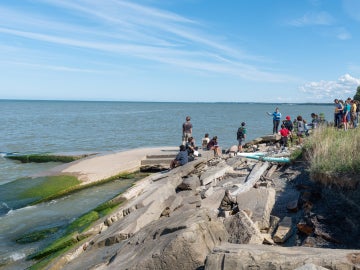Cole Scholars Program Prepares Students for Postgraduate Careers
July 23, 2019
Erin Ulrich '18

A view of Rice Hall, which houses the politics department.
Photo credit: Larry Kasperek
Now in its 25th year, the Oberlin Initiative in Electoral Politics (OIEP) integrates students’ academic study of American campaign politics with experiential learning.
Founded and endowed in 1994 by Richard Cole ’56 and Dorothy Cole ’56, the OIEP is a nonpartisan program that actively engages students in electoral politics. In addition to bringing guest speakers to campus and providing grants for alumni to bolster their campaign skills through workshops, the OIEP is best known for the Cole Scholars program.
Each fall, students from varied academic majors apply to be Cole Scholars, and selected applicants receive professional and monetary support to take part in eight-week political field placements over the summer. Since its conception, more than 200 students have gone through the program, many of whom now mentor current Cole Scholars.
Professor of Politics Eve Sandberg, who has facilitated the program since it began, says that the Coles’ intent behind the program was for students to get their feet wet in real-world political experiences. While past Cole Scholars have done field placements with Bill de Blasio’s mayoral campaign and John Kerry’s presidential campaign, this year’s scholars are gaining experience on Kamala Harris’ presidential campaign, in city council races, and at political consulting firms.
“In the field, Oberlin students have an advantage,” Sandberg says. “By working nine to nine, people in campaigns think of them as staff members. That gets noticed.”
Professor of Politics Michael Parkin, who has worked with the program for the past 10 years, says that Cole applicants typically self-select. “These are pretty politically-minded students when they get to us,” he says. “What the program does is connect them to people. When students leave Oberlin and know they want to stay involved in politics, they have people they know and can call.”

Cole Scholars prepare for their summer placements by taking a spring seminar exploring a range of campaign-related topics, such as ethics, communications, and fundraising. After returning from their field placements in the fall, Cole Scholars enroll in another seminar in which they develop a research paper that incorporates their experiences in the field.
Parkin, who teaches the seminars along with Jenny Garcia, assistant professor of politics and comparative American studies, says the research paper is an opportunity for students to integrate their academic exploration with their personal experiences. After seeing campaigns in real life, he says, “students come back with a richer sense of what campaigns and elections are all about.”
In addition to exposure to real-world political experiences, Cole Scholars gain access to an extensive alumni network through OIEP. Parkin says that students often return to work with their fieldwork placements after graduating from Oberlin.
Politics graduate and former Cole Scholar Molly Brand ’15 took the fall semester off from Oberlin after her summer placement to finish out the campaign she was working with. “I loved it,” she says. “After graduating from Oberlin, my first two jobs were at Democratic consulting firms in D.C. that work for campaigns. The Cole Scholars program gave me a real view of what it means to be part of a campaign, and that experience will definitely be something that I can draw on if I ever consider running for office myself.”
You may also like…
Research Roundup
Every day, Oberlin’s faculty and students produce scholarly work that uncovers new insights into how we understand the world, particularly in the areas of sustainability and the environment.
Oberlin Adds Sport Studies and Management Integrative Concentration
Sport is many things: a vehicle for personal inspiration and identity formation, a catalyst for social change, an economic driver, and a contributor to health and well-being. Given all this, sport is...
Robert W. Fuller ’56, 10th President of Oberlin College, Dies at 88
Robert “Bob” Works Fuller ’56, the 10th president of Oberlin College, died July 15, 2025, in Berkeley, California.


